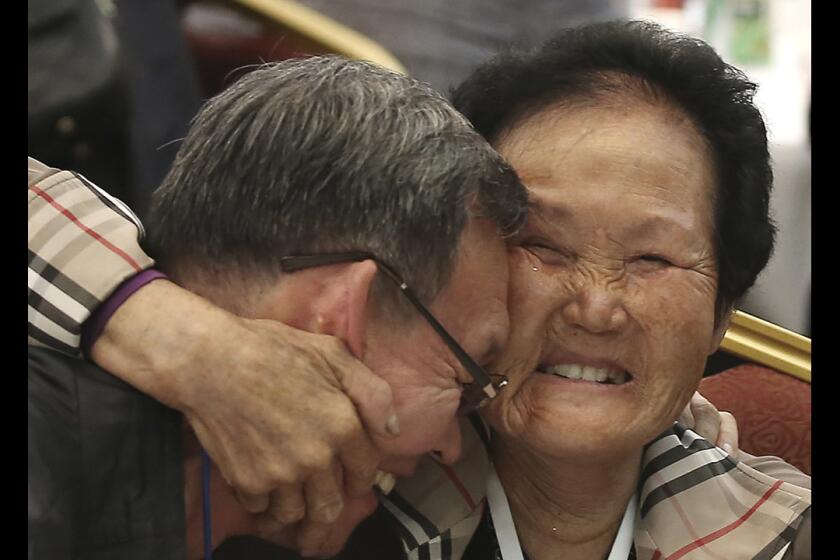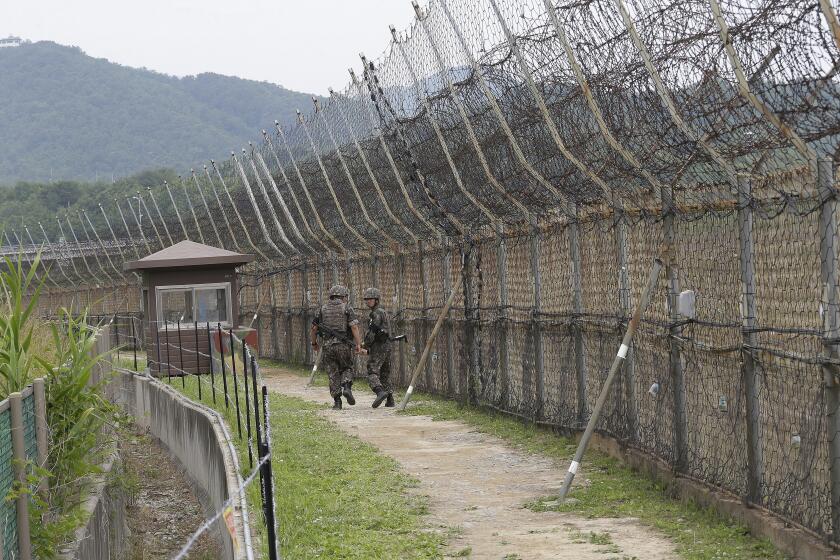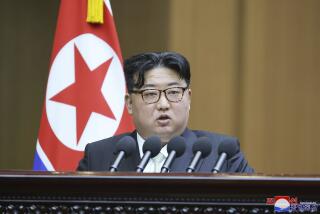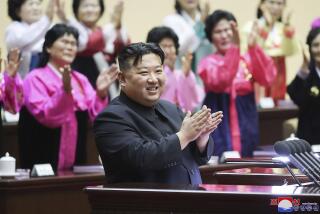South Korea proposes meeting with North to resume family reunions
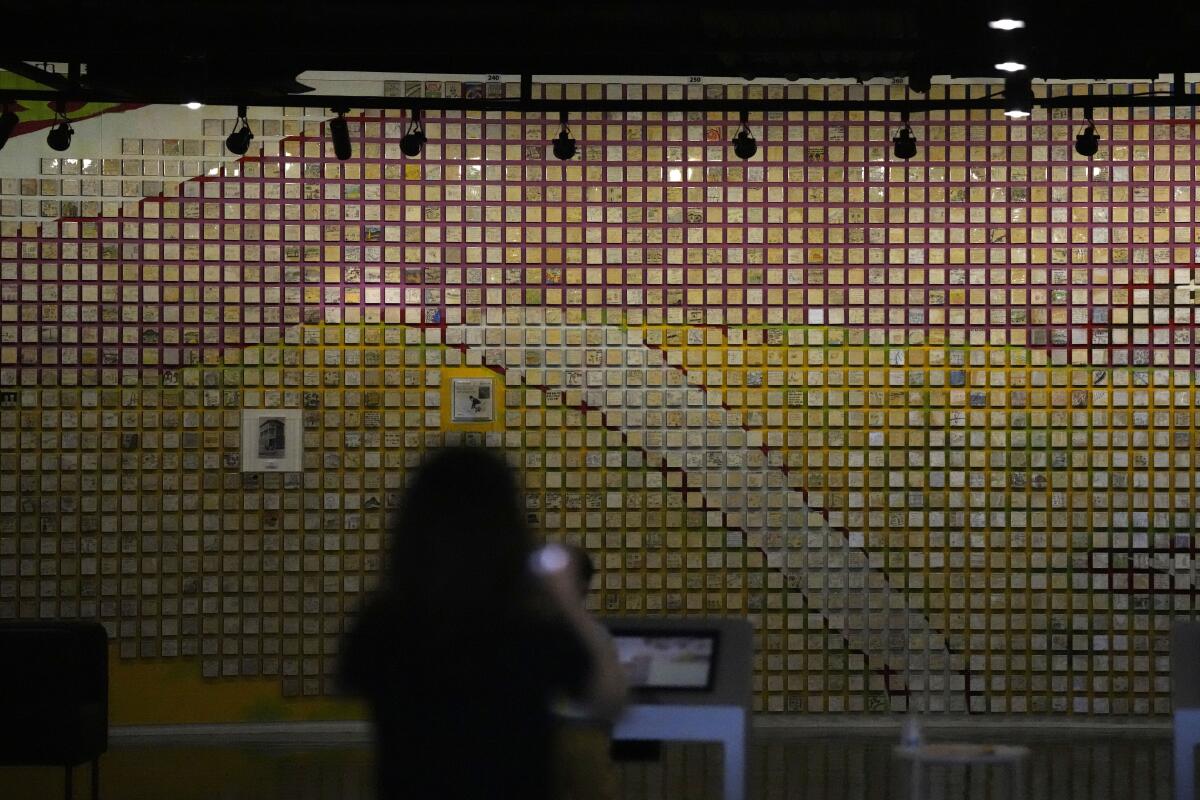
SEOUL — South Korea’s new government Thursday proposed a meeting with the North to resume reunions of families separated since the 1950-53 Korean War, despite long-strained ties between the rivals over the North’s nuclear weapons program.
Family reunions are a highly emotional, humanitarian issue because they involve people now in their 80s and older who are desperate to reunite with their long-lost relatives before they die. But North Korea, which often uses such reunions as a bargaining chip in dealings with South Korea, is unlikely to accept the offer because it is steadfastly rebuffing Seoul’s and Washington’s offers to resume talks on its nuclear program and other issues while focusing instead on perfecting its weapons technology.
“The South and the North should confront the painful parts of the reality. We must solve the matter before the term ‘separated families’ disappears,” Unification Minister Kwon Young-se said in a televised briefing. “We need to use all possible means immediately to come up with quick and fundamental measures.”
Kwon said South Korea hopes that responsible officials of the two Koreas will meet in person as soon as possible for a candid discussion.
His offer came two days before Chuseok, the Thanksgiving holiday celebrated in both Koreas.
Exchange programs between the Koreas remain stalled since the 2019 collapse of broader U.S.-led diplomacy aimed at convincing North Korea to give up its nuclear program in return for economic and political benefits. Washington has urged Pyongyang to return to talks without any conditions, but Pyongyang has said it won’t do so unless the U.S. first drops its hostile policies.
Hundreds of elderly residents from divided North Korea and South Korea began three days of reunions Tuesday with loved ones, many of whom have had no contact since the war between the countries began more than 60 years ago.
Since taking office in May, South Korea’s new conservative government, led by President Yoon Suk-yeol, has offered a massive support plan in return for denuclearization, but North Korea has bluntly rejected it. Yoon has also offered the shipment of COVID-19 relief items, but North Korea has ignored that offer as well. Last month, North Korea blamed its recent COVID-19 outbreak on balloons flown from South Korea and warned of deadly retaliation.
North Korea also is persisting with more than 2½ years of pandemic-related border shutdowns, another possible obstacle to the revival of family reunions.
Some observers say South Korea may try to use talks on family reunions as a way to find a breakthrough in ties with the North. Kwon told reporters that he thinks an offer of dialogue for family reunions can help resolve other issues between the two Koreas.
Since the Korean War ended in an armistice, not a peace treaty, the two Koreas have banned millions of people from visiting relatives across the world’s most heavily militarized border. Decades later, most have no word on whether their loved ones are still alive.
While tens of thousands risk everything to flee North Korea, a few, having failed to adjust to the capitalist South, make a desperate journey back.
The Koreas have occasionally allowed separated families to meet temporarily, but such a reunion hasn’t happened since 2018. According to the South’s Unification Ministry, about 133,650 people in South Korea have applied for reunions, but nearly 70% of them have died.
During past reunions, participants were typically given three days to meet their relatives and none was given a second chance to see them again. Those reunions brought together parents and children, brothers and sisters and others who sobbed, hugged and asked each other about their lives.
South Korea uses a computerized lottery system to pick participants. Observers say the authoritarian regime in Pyongyang chooses citizens loyal to its rule and is reluctant to expand reunions because it worries its citizens’ contacts with more affluent South Koreans could weaken its rule.
During a previous “sunshine” era of inter-Korean detente from 1998-2008, liberal South Korean governments often provided North Korea with rice and fertilizers to hold reunions. Kwon said the new government isn’t considering any incentives to resume reunions.
More to Read
Sign up for Essential California
The most important California stories and recommendations in your inbox every morning.
You may occasionally receive promotional content from the Los Angeles Times.
